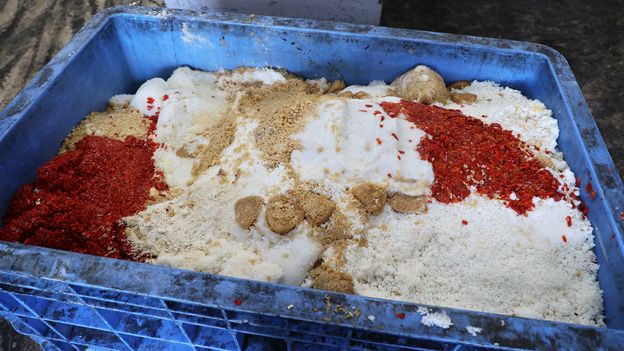…
Japan’s small size and mountainous terrain present challenges for food self-sufficiency. The country imports almost two-thirds of its food and three-quarters of its livestock feed. Yet each year, Japan throws out 28.4 million tonnes of food – much of it edible.
This comes with steep environmental and economic costs. Compared to many countries, consumers in Japan pay higher prices for food because so much of it is imported. And they also pay taxes to cover the majority of the 800bn yen (£4.2bn/$5.4bn) the country spends each year on waste incineration. Food makes up about 40% of the rubbish that Japan incinerates, and incineration produces significant air pollution and greenhouse gas emissions.
As the world’s fifth-largest emitter of greenhouse gases, Japan has set goals of cutting emissions by 46% by 2030 and becoming fully carbon neutral by 2050. Tackling food wastewill have to be a part of those efforts, Takahashi says.



Wouldn’t the pigs get sick?
Unlikely, pigs are omnivores, their stomachs are iron
Humans are also omnivores though, pigs must be different in another important way
True, but humans are like the shittiest omnivores. They need to cook their food to digest it properly. Pigs have no such weakness, they root around in the dirt and eat whatever they find with no issue.
Oh yeah. Obligate "cooked food"ivores
Other than the cooking thing, which is more us understanding it’s better for us than a hard requirement, humans are actually amazing omnivores. Dogs and wolves are some of our closest competitors there and we’re still miles ahead.
Okay, but are we amazing in that we can eat almost anything that is clean and fresh, or that we can handle unclean things filled with bacteria/ other unpleasantness?
My impression is that it’s the first, we can have a very varied diet unlike most other animals who are a bit more specialised (or in some cases very specialised), but my dog regularly eats things that would turn my stomach inside out.
Yeah but no one gives a fuck about their health so long as taste is fine and price is cheap
Ignoring even any ethical concerns, that’s just not true. Livestock is something that commercial farmers do not want to be unhealthy because it creates costs, problems, and spreads.
Death is famously the peak of health
At slaughter, it stops being a hog and starts being pork but, whilst there are other bacterial and similar concerns, it isn’t being fed anymore at that point.
Before slaughter, some farmers sell feeder pigs for other people to raise until slaughter. In order to get paid, no one in that chain wants to actively harm their health if only because it impacts their bottom line.
A non-animal way of looking at it would be producing mushrooms on some media. If I could safely and effectively grow my mushrooms on a medium that recycles something without otherwise damaging them on cheaper/greener material, why wouldn’t I do that? Conversely, why would I if that material ended up costing me more in the long run by stunting growth or something?